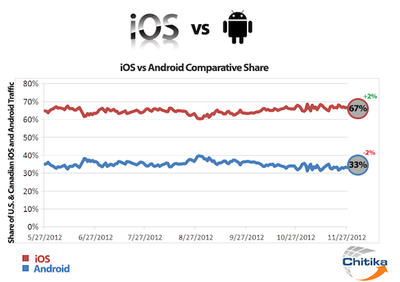Chitika Insights has released a new six-month study that has found that iOS devices' mobile web share has grown 2% over the past two months while Android devices' mobile web share has decreased 2%. The data spans the six-month timeframe of May 27th, 2012 to November 27th, 2012 and includes devices like the Samsung Galaxy S III, the Kindle Fire HD, the Nexus 7, iPad mini, iPad fourth generation and iPhone 5.

According to the data, the share for iOS is at 67% while Android sits at 33%. Over the past six months, iOS has been hovering around 65% while Android hovered around 35%. The peak of Android's share was 40% in late August, which Chitika attributes to the strong sales of the Galaxy S III. That peak softened after the release of iPhone 5 and the new iOS tablets.
Chitika notes that Apple's significant advantage in tablet sales with the iPad and iPad mini is the biggest factor in the mobile web share dominance. Apple also has its' iPod Touch line contributing to its share, while Android's popularity and share is mostly due to smartphones.
The data is also suggesting that users don't switch between mobile operating systems, according to Chitika. They note that if their suggestion is true, Android manufacturers are competing with themselves while Apple is in no danger of a dwindling user base.
























Top Rated Comments
But it is comments like this one which start unnecessary and useless flame wars,android is not 'ass' or something,it suits the purpose for million other who love it,not for me or you,similarly iPhone 5 is best for you and me and millions others,but similarly an S3 or Note2 is for millions others too.
One should respect others choices as well.
Ah, the old mantra of choice.
People want choice, to a degree' and to an extent it does make them happy. But more choice and a greater sense of satisfaction - better user experience - are not linked in nearly so linear a way as you think. The graph you'd see if you plotted choice against satisfaction would be a sharp, upwards curve for a short distance (going from no choices to a few choices makes people happier) followed by a flattening (When people have enough choice, more choice doesn't help them much) and then a big drop off (people faced with too many choices are constantly confused and overwhelmed and feel that any choice they make is likely to be wrong).
You should Google the Paradox of Choice. There's plenty of good science on this topic. The main point is that being able to choose precisely what you want (a la Android) actually leads to lower satisfaction whereas having fewer options and simpler choices (a la iOS) leads to greater satisfaction.
And the customer feedback supports this too - it's not just theory. Apple's customer satisfaction scores are higher than anyone else in any sector they compete in. If you were right about choice and a feeling that a product was "tailor made" then surely Android users would be happier - they aren't.
----------
These figures are a percentage of the total, not absolute usage. There is far more web usage coming from Android devices today than in prior years, but as a percentage it's staying fairly steady compared to iOS.
----------
Songs, movies and books from iTunes work on non-Apple devices. Only Apps are iOS exclusive. I can play an album, watch a movie and read a book bought from Apple on Windows PCs, various PMPs, Android devices and other e-readers.
Couldn't agreed more :D
In the US, lot of them are free.
I'd like to see stats from Akamai or Google Ads to see how the data compares :)